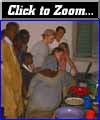
The American Ambassador to Mali, David Rawson, and his wife, Sandy came to visit the archaeological sites today. There was much excitement and everybody was cleaning up their excavation units so they would look their best for the Ambassador's site tour. He had lunch with my Mom and Dad. They have become good friends. My parents are going to have dinner with the Ambassador tonight at 9:00 but Annick and I are not allowed to go. The adults say we wouldn't like it because there are going to be speeches and talks and things like that.
I spoke with the Ambassador about his work here. He said that it is important that Mali have an Ambassador from the United States because America wants to help the Malians and provide for the growing population and to protect the American people already there. He says that Mali is a very old country and that there were many civilizations before the United States was ever born. It is important for us to know the history and culture of Mali. He has been an Ambassador for almost a year now and he says that he enjoys getting to know the country and the people in it.
I will be leaving Djenné tomorrow and I will miss this place greatly. I was given a small aluminum bracelet by Almamy, one of the boys I interviewed. It has a unique design on the face of it and looks very different than any jewelry in the United States. Almamy is a really nice guy. He always smiles when he sees me and when we greet we shake hands. I consider him a good friend even though we have a hard time communicating.
In Mali, when you enter a room or meet someone on the street you greet the person and shake their hand whether you know the person or not. We greet them in French by saying Ca va? or in Bambara by saying Ini sogoma? (How are you this morning?) At first I felt uncomfortable with this but now I am used to it. Greetings are so important here that it is impossible to do anything until you have said hello, asked about people's health and their family, and answered their questions about yours. If you don't do this, it is considered shockingly rude. I will have to remember that this is not necessary in the United States. One day, my sister and I looked out the window and we say a donkey being slaughtered in the street. This is not something you see each day in Houston. The blood and offal was collected in a bucket while the meat was sold to other people. We were worried this was the donkey that had been tethered right outside our window! But, thankfully, this donkey was safe and sound attached to a donkey cart miles away.
I will miss the sights and sounds of Djenné greatly, such as the constant river of people flowing outside our house, the talking and greeting, the donkeys braying, and the roosters crowing. I have grown to like them. However, I do look forward to seeing my class again, taking a real shower (not a bucket bath), playing cool games on the computer, and not eating tiga dege.
 I hope you have enjoyed my postings. I have enjoyed interviewing the people
here and I have learned a lot about the life here, more than if I was just a
tourist. One of the things that was really enjoyable was sharing the Quicktake
photo pictures with the people I interviewed. For instance, after I
photographed Yama (our cook) in the kitchen downstairs, I called her up to come
take a look. Yama plus about ten curious kids came up and gathered around the
computer. Her picture came up on the screen and they all looked at it in
surprise and laughed. I am not sure if she believed us when we told her that
her picture was able to be viewed by people all over the world. I have only
been here for two weeks but I miss Mali even before I leave!
I hope you have enjoyed my postings. I have enjoyed interviewing the people
here and I have learned a lot about the life here, more than if I was just a
tourist. One of the things that was really enjoyable was sharing the Quicktake
photo pictures with the people I interviewed. For instance, after I
photographed Yama (our cook) in the kitchen downstairs, I called her up to come
take a look. Yama plus about ten curious kids came up and gathered around the
computer. Her picture came up on the screen and they all looked at it in
surprise and laughed. I am not sure if she believed us when we told her that
her picture was able to be viewed by people all over the world. I have only
been here for two weeks but I miss Mali even before I leave!